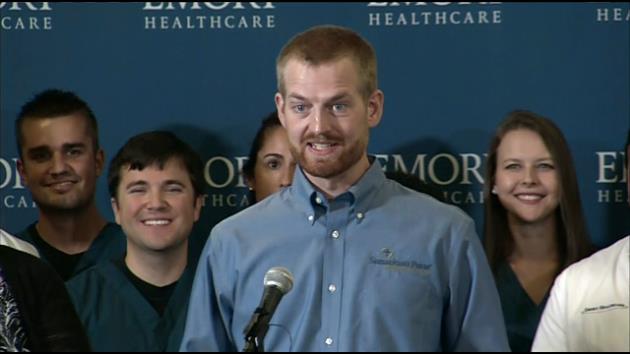By KATHLEEN FOODY
Associated Press
ATLANTA (AP) — An American doctor infected with Ebola left his isolation unit and warmly hugged his doctors and nurses on Thursday, calling it a “miraculous day” and showing the world that he poses no public health threat one month after getting sick with the virus.
Dr. Kent Brantly and his fellow medical missionary, Nancy Writebol, who was quietly discharged two days earlier, are still weak but should recover completely, and no one needs to fear being in contact with them, said Dr. Bruce Ribner, who runs the infectious disease unit at Emory University Hospital.
Brantly’s reappearance, together with his wife and hospital workers, was festive and celebratory, a stark contrast to their arrival at the hospital three weeks earlier, when he was under police escort and shuffled inside wearing a bulky white hazardous material suit.
“I am thrilled to be alive, to be well, and to be reunited with my family,” Brantly said, choking up several times as he read a written statement. Then he hugged and shook hands with each staff member. For some, it was their first direct contact after wearing protective gear in the isolation unit.
After Brantly, 33, and Writebol, 59, were infected while working with Ebola victims in Liberia, their charity organizations, Samaritan’s Purse and SIM, reached out to top infectious disease experts for help.
Working connections, they obtained one of only five courses yet created of an experimental drug known as Zmapp, and Brantly and Writebol split the doses before being evacuated to Atlanta. The other four have since been given to a Spanish priest, who died, and three doctors in Africa, who have been improving.
Ebola has killed more than 1,300 people in West Africa’s first outbreak. At Emory, a crew of five infectious disease experts and 21 nurses provided rigorous care for Brantly and Writebol, lab technicians did frequent tests and many experts were consulted.
In Africa, many hospitals lack advanced laboratories, and even such basics as IV fluid can be in short supply.
Bringing the Americans to Atlanta was controversial, but “it was the right decision,” Ribner said. “What we learned in caring for them will increase understanding and hopefully help those people in West Africa.”
At least 2,473 people have been sickened in the region — more than the caseloads of all the previous two-dozen Ebola outbreaks combined, according to the World Health Organization.
Brantly didn’t take questions at Thursday’s news conference, but he did briefly describe how they confronted Ebola back in Liberia. He said aid workers had begun “preparing for the worst” after learning of the outbreak in March, and saw their first patient in June. Soon, many more arrived.
He said his team took all the precautions they could. His wife and children returned to the U.S., and he focused on. Three days later, he woke up feeling sick and was diagnosed with the disease.
“As I lay in my bed in Liberia for the following nine days, getting sicker and weaker each day, I prayed that God would help me to be faithful even in my illness,” Brantly said. “Through the care of the Samaritan’s Purse and SIM missionary team in Liberia, the use of an experimental drug, and the expertise and resources of the health care team at Emory University Hospital, God saved my life.”
His doctors cautioned that it remains unknown whether the experimental drug helped Brantly and Writebol, or whether they improved despite the drug. The treatment is so novel that it hasn’t been tested in people, and it might not have made any difference at all.
“Experimental means exactly that. They are the very first individuals to have received this treatment, and frankly we do not know,” Ribner said.
Both patients were discharged after their medical team made sure they pose no public health risk, he said. Neither patient’s blood showed evidence of Ebola, which is spread only through direct contact with the bodily fluids of sick people experiencing symptoms. Ebola survivors generally are not contagious once they’ve recovered.
Still, both families asked for time alone to recover fully. David Writebol said in a statement that his wife is recuperating at an undisclosed location, and is “greatly encouraged knowing that there were so many people around the world lifting prayers to God for her return to health.”
Neither survivor is saying what they’ll do next. Ribner said there’s no concern of a relapse, “and in fact we would anticipate immunity from this virus if they were treating patients during this outbreak.”
Before he left the hospital, Brantly appealed for help for those he left behind.
“Please continue to pray for Liberia and the people of West Africa, and encourage those in positions of leadership and influence to do everything possible to bring this Ebola outbreak to an end,” he said.
——
Associated Press writer Jeff Martin contributed to this report.
Copyright 2014 The Associated Press. All rights reserved. This material may not be published, broadcast, rewritten or redistributed.

